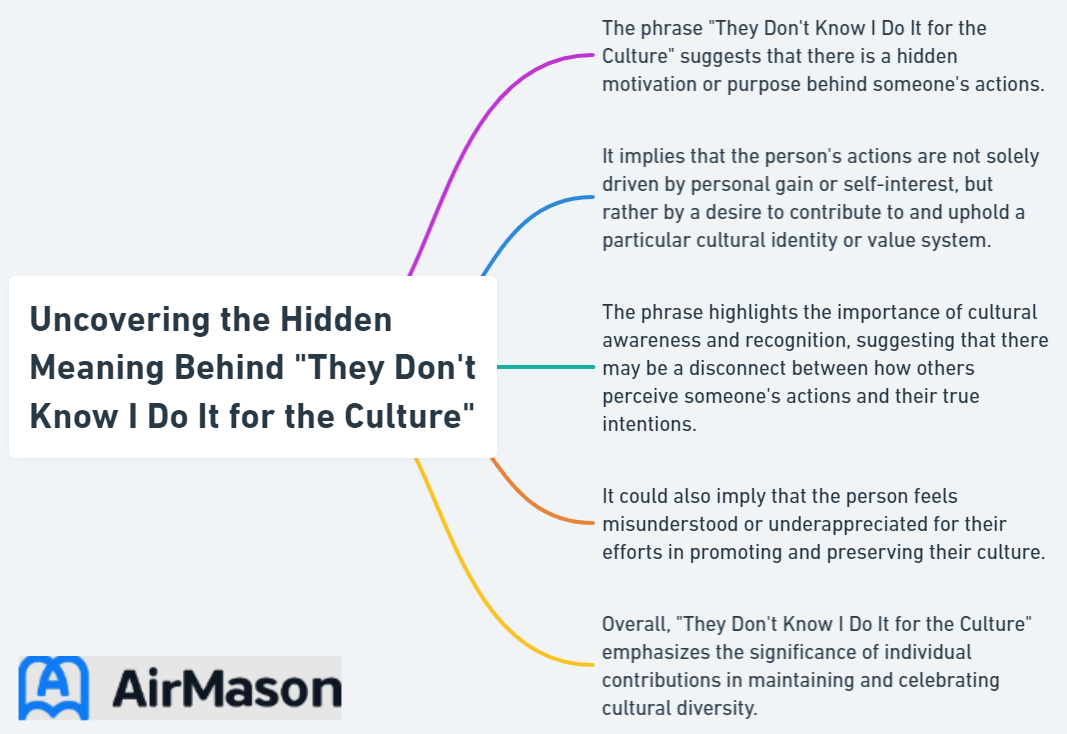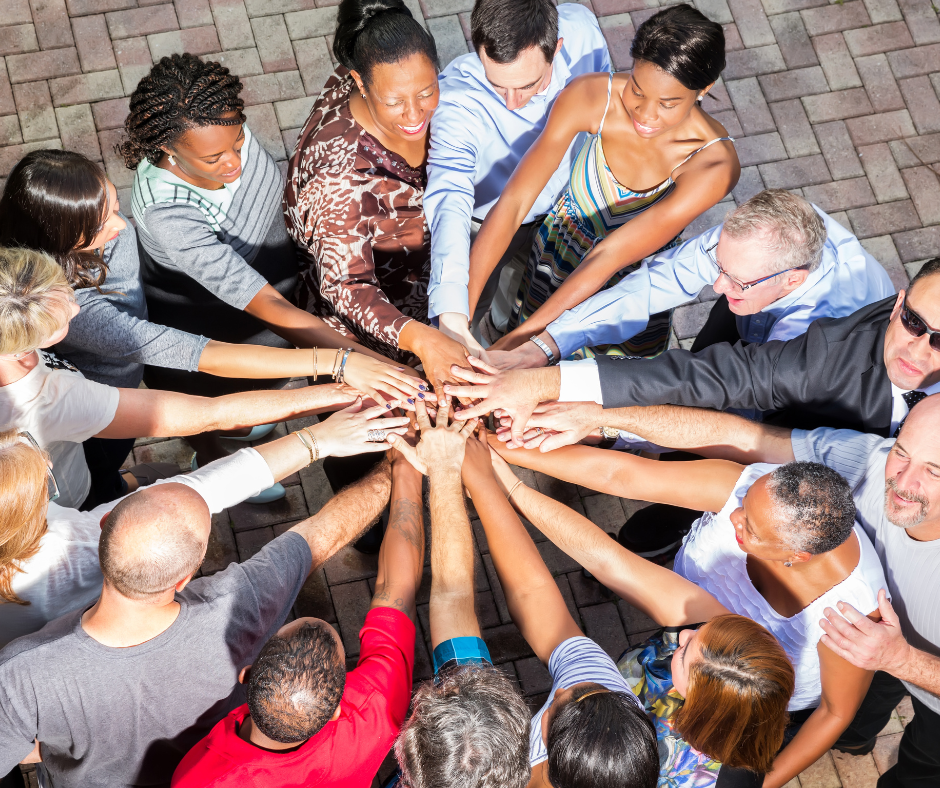
Understanding and embracing cultural differences is more important than ever in our increasingly interconnected world. Netflix, a global streaming giant, has created a unique culture that fosters collaboration, innovation, and inclusivity among its employees. In this blog post, we will explore the hidden meaning behind the phrase “they don’t know I do it for the culture” and delve into the importance of cultural identity, navigating cultural differences, the role of culture in organizations, culture and community building, and the power of cultural knowledge.
By examining the various aspects of cultural identity and understanding, we can gain valuable insights into what makes individuals and communities thrive. Through this exploration, we aim to inspire readers to embrace cultural diversity and harness its potential for personal growth, increased understanding, and stronger connections between individuals and communities. In doing so, we can truly say that “they don’t know I do it for the culture,” as our actions and intentions are driven by a genuine desire to promote and celebrate the richness of cultural diversity.
Key Takeaways
- Embrace cultural identity to promote personal growth and understanding of diverse backgrounds.
- Celebrate cultural diversity to create a sense of belonging, respect, and collaboration between cultures.
- Leverage the power of culture through education, exchange, and appreciation for increased awareness in order to foster an inclusive society.
Embracing Cultural Identity
Personal growth and understanding greatly benefit from the embrace of cultural identity, which encompasses various aspects such as:
- Everyday life
- Traditions
- Family
- Heritage
- Matter
These aspects shape an individual’s worldview and values. For example, certain Asian Americans with different backgrounds have indicated that engaging with Christian culture is a requisite for social acceptance in the United States. When we recognize our own culture’s significance, it enhances our connections with individuals from diverse cultures while fostering inclusive communities.
As human beings, we are all shaped by our cultural experiences and backgrounds. Whether we are part of a western culture or any other culture in the world, understanding and appreciating our own culture helps us develop a sense of identity and belonging. This deep connection to our roots enables us to form stronger relationships with others, both within our own communities and with those from different backgrounds.

Everyday Life and Traditions
Our cultural identity is often most apparent in our everyday life and traditions. These practices, rituals, and customs are passed down through generations and serve as a reflection of our values and beliefs. For instance, Buddhism is generally regarded as a way of life, which makes sense to many people who practice it. The cycle of events, including Lunar New Year, births, and deaths, is closely associated with one’s identity as a Buddhist, and it’s common for Buddhists to talk about these events.
Observing and participating in these traditions and customs enrich our understanding of our own culture and the cultures of others. This knowledge allows us to appreciate the rich diversity of human experiences and build connections with people from different backgrounds. Additionally, recognizing the importance of everyday life and traditions in shaping our cultural identity can inspire us to preserve and celebrate these practices for future generations.
Family and Heritage
Family and heritage play a significant role in shaping an individual’s cultural identity, providing a sense of belonging and connection to their roots. Asian Americans have strong cultural connections to Christianity. These often involve celebrating religious holidays and festivals with family. Understanding and appreciating the role of family and heritage in our lives nurtures our cultural identity and strengthens bonds with others who share similar backgrounds.
In addition to the impact of family and heritage on our cultural identity, it is also important to acknowledge the role of organizations in shaping our values and practices. For example, Netflix’s approach to management focuses on creating a dream team, prioritizing performance over seniority or tenure. Appreciating how our experiences, both within and outside of our families, shape our cultural identity, allows us to gain a broader understanding of the diverse influences that form our sense of self.
An Organization’s Culture
An organization’s culture is the collective set of values, beliefs, and behaviors that shape its identity and guide the actions of its members. It serves as the glue that holds a company together, influencing how employees interact with one another and with external stakeholders. A strong organizational culture fosters a sense of belonging and purpose, aligning individuals towards a common mission. It influences decision-making processes, from hiring practices to strategic initiatives, and ultimately determines the organization’s trajectory. Moreover, an organization’s culture has a profound impact on employee satisfaction and retention, as individuals are more likely to thrive in an environment that resonates with their own values and work ethic. Therefore, understanding, nurturing, and evolving an organization’s culture is crucial for long-term success and sustainability.
Navigating Cultural Differences

Navigating cultural differences is crucial for fostering understanding and respect among diverse groups. Developing cultural sensitivity, confronting biases, and facilitating open communication can help create an inclusive and accepting environment that values the unique contributions of individuals from different backgrounds. Understanding and respecting cultural differences can strengthen relationships and foster collaboration within diverse communities.
Effective communication plays a vital role in navigating cultural differences. Through open dialogue, inclusive communication, and respecting different perspectives, we can establish trust and rapport across cultures. Comprehending unique communication patterns and preferences ensures respectful and productive interactions, thereby enhancing our relationships with individuals from different cultural backgrounds.
Communication and Decision Making
Communication and decision-making styles can vary across cultures, making it essential to understand these differences when building strong relationships and collaboration. Getting acquainted with various decision-making styles, like consensus-based or hierarchical decision-making, can prevent misunderstandings, foster trust, and facilitate well-informed decisions that consider diverse perspectives.
An appreciation of different communication styles can improve intercultural relationships by:
- Encouraging effective communication
- Constructing trust and rapport
- Stimulating empathy and understanding
- Resolving disputes
Recognizing various communication styles across different cultures, like individualism versus collectivism, high context versus low context, or directness versus indirectness, allows us to navigate cultural differences easily and foster strong collaborations in multicultural settings.
Overcoming Stereotypes and Prejudices
Overcoming stereotypes and prejudices is necessary for promoting inclusivity and breaking down barriers between different cultural groups. Recognizing and addressing these stereotypes can foster understanding and inclusivity, thereby cultivating an environment of respect and acceptance for individuals from various cultural backgrounds.
Some effective methods to overcome stereotypes and prejudices in society include:
- Traveling to places that challenge one’s worldview
- Taking courses on prejudice and discrimination
- Reflecting on one’s own beliefs
- Building internal resilience against prejudice and discrimination
Actively engaging in these practices helps dismantle stereotypes and prejudices, thereby fostering a more inclusive and harmonious society that values the unique contributions of individuals from diverse backgrounds.
The Role of Culture in Organizations

The role of culture in organizations is vital for creating inclusive work environments and culturally sensitive leadership, which can lead to increased productivity, innovation, and employee satisfaction. Embracing cultural diversity within the workplace allows organizations to foster creativity, strengthen their teams, and cater to the needs of people from diverse backgrounds. Netflix, for example, emphasizes collaboration with skilled personnel in highly imaginative and efficient manners as part of its employee culture.
In addition to fostering inclusivity and promoting cultural sensitivity, understanding the role of culture in organizations is also crucial for effective decision-making. Netflix’s decision-making process includes the following key elements:
- No consensus is required for decision-making.
- The goal is to prevent precipitous and uninformed decisions.
- There is a clear delineation of responsibility.
Integrating cultural awareness into organizational processes and leadership enables companies to cultivate environments that thrive on diversity and innovation.
Creating Inclusive Work Environments
Creating inclusive work environments involves recognizing and valuing cultural diversity, fostering open communication, and providing equal opportunities for all employees. Embracing culturally responsive teaching and incorporating diverse learning materials can help organizations build environments where employees from all backgrounds feel valued and included.
Several organizations, such as Marriott International, Sodexo, Deloitte, and Woolworths Group, have implemented diversity and inclusion strategies and fostered inclusive cultures within their organizations. By promoting cultural diversity within the workplace, companies can encourage creativity and innovation, strengthen their organization, and enhance employee engagement and satisfaction.
Culturally Sensitive Leadership
Culturally sensitive leadership is essential for managing diverse teams, as it involves understanding and respecting cultural differences and adapting leadership styles accordingly. Recognizing and addressing personal biases, cultivating cultural competence, and adapting to changing circumstances allow leaders to effectively manage teams with diverse backgrounds and experiences.
The advantages of culturally sensitive leadership in diverse teams include:
- A wider range of experience and perspective
- Heightened consciousness
- A higher likelihood of observing positive change
- Augmented team performance and productivity
- The promotion of an inclusive work environment
Embracing culturally sensitive leadership enables organizations to foster strong, diverse teams excelling in creativity, innovation, and collaboration.
Work for Curated
If you’re seeking opportunities to “work for curated,” you’re likely interested in a niche job market that emphasizes personalized, high-quality experiences. Curated work environments prioritize attention to detail, customization, and a deep understanding of individual preferences. This can be particularly prevalent in industries like luxury goods, high-end hospitality, and bespoke services, where tailoring experiences to each customer is paramount. Working for a curated brand often means being part of a team that values craftsmanship, exclusivity, and a dedication to exceeding customer expectations. It may involve roles in product curation, personalized service delivery, or even marketing strategies that highlight the uniqueness and individuality of the offerings. In essence, when you work for curated, you are contributing to a brand’s commitment to providing exceptional, one-of-a-kind experiences that resonate with discerning clientele.
Culture and Community Building

Culture and community building go hand in hand, as celebrating cultural diversity and finding collaborative solutions to tough problems can lead to stronger, more resilient communities. Organizing events and activities that showcase different cultures, traditions, and perspectives can foster understanding and appreciation among community members.
Furthermore, bringing together diverse perspectives and experiences can foster creativity and innovation in problem-solving, leading to collaborative solutions to tough problems. By embracing cultural diversity and promoting intercultural dialogue and collaboration, communities can create a more inclusive and supportive environment that benefits all members.
Celebrating Cultural Diversity
Celebrating cultural diversity involves organizing events and activities that showcase different cultures, traditions, and perspectives, promoting understanding and appreciation among community members. Creating opportunities for individuals to share their cultural experiences can foster a sense of belonging and connection within the community.
Some examples of events that are effective in celebrating cultural diversity include:
- Diversity-themed corporate events
- Appreciate Diversity Month celebrations
- Immersion activities
- Cultural potlucks
- Inclusive event ideas for World Day of Cultural Diversity
By organizing and participating in these events, communities can nurture an environment of understanding, respect, and appreciation for the diverse cultures that enrich our world.
Collaborative Solutions to Tough Problems
Collaborative solutions to tough problems can be achieved by:
- Bringing together diverse perspectives and experiences
- Fostering creativity and innovation in problem-solving
- Uniting disparate points of view and backgrounds
This allows communities to develop innovative solutions to their challenges and create a more resilient and supportive environment for all members.
Successful collaborative solutions to problems that involved cultural diversity have included:
- Overcoming language and cultural barriers
- Acknowledging and respecting cultural differences
- Constructing more robust cross-cultural teams
- Forming a collaborative culture in the workplace
By embracing the power of cultural diversity and fostering collaboration among diverse groups, communities can tackle tough problems and create a more inclusive and supportive environment for all members.
The Power of Cultural Knowledge

The power of cultural knowledge lies in learning from other cultures and encouraging cultural education and exchange, which can lead to personal growth, increased understanding, and stronger connections between individuals and communities. Gaining insight into the customs, traditions, and ways of life of different cultures can broaden our perspectives and deepen our appreciation for the diverse world we inhabit.
Acquiring knowledge of a culture that is distinct from one’s own is essential in becoming a global citizen and leader. Understanding and valuing other cultures aids in developing empathy and compassion, fostering a more inclusive and harmonious society that celebrates the unique contributions of individuals from diverse backgrounds.
Learning from Other Cultures
Learning from other cultures involves being open to new ideas, perspectives, and practices, which can enrich our own understanding and worldview. Engaging in research, education, and dialogue with individuals from different cultural backgrounds expands our knowledge and deepens our appreciation for the diversity of human experiences.
The advantages of learning from other cultures include:
- Cultivating a wider outlook and respect for diversity
- Refining communication abilities
- Increasing cultural awareness and sensitivity
- Furthering personal development and self-awareness
By embracing the opportunity to learn from other cultures, we can foster a more inclusive and understanding society that values the unique contributions of individuals from diverse backgrounds.
Encouraging Cultural Education and Exchange
Encouraging cultural education and exchange can be achieved through programs, events, and initiatives that promote intercultural dialogue, understanding, and collaboration. Providing opportunities for individuals to engage in cultural education and exchange can help communities foster a sense of belonging and connection among their members.
Some successful cultural exchange initiatives across the world include:
- Global exchanges through cities as a form of cultural diplomacy
- Short-term exchange programs providing an in-depth understanding of a country’s culture
- Leadership exchange programs supported by organizations such as Bloomberg Philanthropies
- Cultural exchange programs that involve youth, students, educators, artists, athletes, and emerging leaders
By promoting cultural education and exchange, communities can create a more inclusive and supportive environment that benefits all members.
Good Working Environment Examples
A conducive work setting is paramount for employee satisfaction and productivity. One prime example of a good working environment is a well-designed office space with ample natural light and ergonomic furniture, providing a comfortable and energizing atmosphere. Another crucial factor is open communication and a culture of respect among colleagues, fostering a positive and collaborative work environment. Flexible work hours and remote work options are also noteworthy examples, allowing employees to balance their professional and personal lives effectively. Additionally, a supportive management team that recognizes and appreciates employee contributions contributes significantly to a positive working atmosphere. Finally, access to professional development opportunities and resources, such as workshops, training programs, and up-to-date technology, ensures that employees feel valued and equipped to excel in their roles. These examples collectively create a conducive and motivating work environment that promotes employee well-being and overall organizational success.
Summary
Throughout this blog post, we have explored the hidden meaning behind the phrase “They Don’t Know I Do It for the Culture” and delved into various aspects of cultural identity, understanding, and the role of culture in organizations such as Netflix. By embracing cultural diversity and fostering understanding and respect among diverse groups, we can create stronger connections between individuals and communities, promote personal growth, and develop a more inclusive and harmonious society.
In a world that is becoming increasingly interconnected, understanding and appreciating different cultures is more important than ever. As global citizens and leaders, it is our responsibility to learn from other cultures, encourage cultural education and exchange, and create inclusive environments that celebrate the unique contributions of individuals from diverse backgrounds. By doing so, we can foster a more understanding, compassionate, and resilient world for all.
Frequently Asked Questions
How can understanding cultural differences improve relationships and communication?
Understanding cultural differences can promote empathy, respect and appreciation for diverse perspectives, leading to more open dialogue and improved relationships and communication.
What are some examples of events and activities that can effectively celebrate cultural diversity?
Celebrating cultural diversity can take many forms, such as corporate events, Appreciate Diversity Month celebrations, immersion activities, cultural potlucks, and inclusive event ideas for World Day of Cultural Diversity.
How can organizations create inclusive work environments and culturally sensitive leadership?
Organizations can foster inclusive work environments and culturally sensitive leadership by embracing cultural diversity, encouraging open communication, providing equal opportunities, and adapting leadership styles to respect cultural differences.
What are the benefits of learning from other cultures?
Learning from other cultures has numerous benefits, such as widening our perspective, aiding personal growth, developing cultural awareness and sensitivity, and fostering a more accepting society.
What are some successful cultural exchange initiatives across the world?
Successful global cultural exchange initiatives include city-to-city exchanges as a form of cultural diplomacy, short-term exchange programs that provide an understanding of a culture, leadership exchange programs from organizations such as Bloomberg Philanthropies, and programs that involve youth, students, educators, artists, athletes, and emerging leaders.
Uncovering the Hidden Meaning Behind “They Don’t Know I Do It for the Culture”
Understanding and embracing cultural differences is more important than ever in our increasingly interconnected world. Netflix, a global streaming giant, has created a unique culture that fosters collaboration, innovation, and inclusivity among its employees. In this blog post, we will explore the hidden meaning behind the phrase “they don’t know I do it for the culture” and delve into the importance of cultural identity, navigating cultural differences, the role of culture in organizations, culture and community building, and the power of cultural knowledge.
By examining the various aspects of cultural identity and understanding, we can gain valuable insights into what makes individuals and communities thrive. Through this exploration, we aim to inspire readers to embrace cultural diversity and harness its potential for personal growth, increased understanding, and stronger connections between individuals and communities. In doing so, we can truly say that “they don’t know I do it for the culture,” as our actions and intentions are driven by a genuine desire to promote and celebrate the richness of cultural diversity.